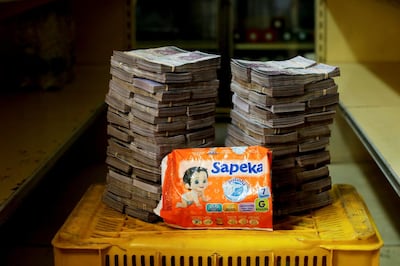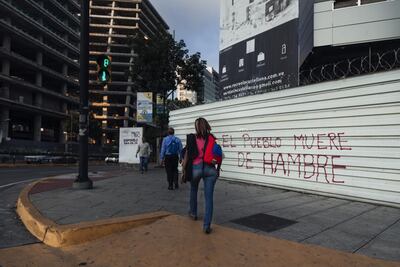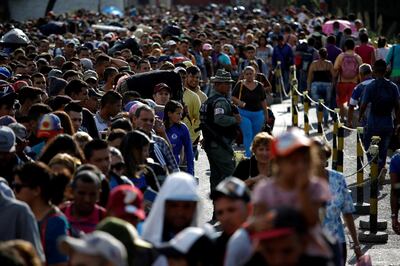The narrow two-lane Simón Bolívar International Bridge that connects the Venezuelan city of San Antonio with the neighbouring Colombian city of Cúcuta is, almost daily, packed with thousands of desperate Venezuelans trying to escape their collapsing country on foot.
Around one million have left for Colombia since 2015, according to the United Nations. They are fleeing a failed and corrupt political regime, a broken health system and a near-worthless currency – destroyed by an inflation rate that could reach one million per cent this year – that devours their wages.
But among those crowds are nefarious individuals seeking something entirely different: a more fruitful arena for their criminality. Common delinquents and members of some of Venezuela’s most dangerous gangs are disguising themselves as migrants to leave the country and establish criminal franchises abroad.
Johnny, who agreed to speak on condition of anonymity, is part of this controversial group of migratory bandits. The 28-year-old grew up around a life of crime in the slums of west Caracas. His barrio is a place with narrow alleys, houses on top of one another and sewers that run through the middle of the street. He says he has been a criminal for more than 15 years. On his record are a list of serious crimes: robbing, kidnapping, drug dealing and, several murders.
Many of Johnny's friends have left for Colombia and now he is preparing to make the same journey to "give it a try" and earn a better living for himself illegally. Johnny claims he has other malandro, or thug, friends who "go straight" when they leave Venezuela. "But not me though," he says.
“I have been there [Colombia] several times. To cross the border is very easy. We used to go there for a couple of weeks to do ‘little jobs’ and then come back, but now I have decided to go indefinitely,” he says.

The economic crisis created by Mr Maduro, the country’s isolated and broke leader, has rendered the Venezuelan bolivar so worthless that he removed five zeros from the currency in August to simplify transactions. Ten bolivars now equal what was one million of the old currency.
In the Venezuela of former socialist president Hugo Chávez, rampant impunity and corruption laid the ground for the world’s highest levels of violence and allowed all types of criminal activity to proliferate. Under the government of his successor Nicolás Maduro, the big Venezuelan mafias known as ‘mega-bands’ are finding trouble operating on their own territory.
For Venezuela’s bandits, robbing a shop or money truck is now virtually pointless. The devaluation of the bolivar has left many ordinary people struggling to eat and drink, let alone afford expensive valuables.
In Colombia, “if you rob someone you can get a nice phone or nice wristwatch and you can actually see the profit is different here in Venezuela,” Johnny says. “These days you can rob a bank and you won’t make enough for food, it’s tough.”

The creation of state-backed paramilitary forces like the FAES, or Special Actions Force, which are accused by rights groups of extrajudicial killings, are increasing the dangers for gangsters involved in abductions, drug-dealing and other criminal activities.
“We used to kidnap rich people every three months and, with the ransom, we could live well for a couple of months. But right now this is too risky because they don’t capture kidnappers, they kill them,” says Johnny.
“Most of the people don’t have the money we ask for, it’s a waste of time. We prefer to go someplace else and we know what we do is terrible but it’s all we know and all we can do.”
In Colombia, more than 3,400 Venezuelans have been detained for committing crimes from 2015 until June this year, mostly for muggings and thefts. Yet the exodus of Venezuela's criminals is not solely limited to Colombia, it also threatens a knock-on effect for other Latin American states.

Peruvian authorities recently captured five members of the so-called Tren de Aragua, one of the most brutal gangs in Venezuela, who were planning to rob a jewellery shop. In Chile, seven members of a Venezuelan gang dedicated to stealing luxury watches were captured in April. In Brazil's northernmost state, Roraima, where more than 120,000 Venezuelans have entered, crime has risen 132 per cent since 2015.
The exporting of bandits from Venezuela to surrounding nations will have a direct short and long-term impact on foreign policies towards the country and those who are genuinely trying to flee for a better life, Venezuelan lawyer and criminologist Luis Izquiel says.
_______________
Read more:
Venezuela says jailed lawmaker took his own life
Venezuela says Colombia’s president is shielding Nicolas Maduro’s attackers
US sanctions Venezuelan president's wife
_______________
“It will create a lot of media attention as the Venezuelan criminals are very cruel. In other countries, beheadings or people being shot 50 times are very rare. Here, in Venezuela, this type of crime is sadly common,” he says. “This will make all the countries receiving Venezuelans closely review all the citizens entering their borders.”
The Venezuelan government continues to deny that it is exporting criminals across the continent, or that there is even a migration crisis, blaming “fake news” generated by the media to discredit Mr Maduro.
But, as Johnny finishes packing up his bags, he picks up his old shotgun, ready for his next life in Colombia.
“I wish I could take you with me,” he sighs as he stares at the weapon.

